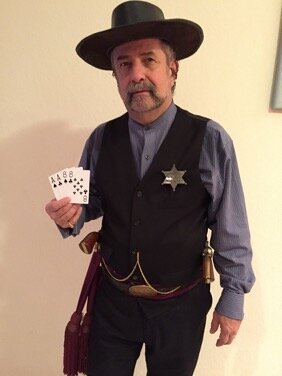The Old West fast-draw showdown in the middle of Main Street (often at high noon) has been a staple of the Western film genre since its beginning in the 1920s. Of course it almost never happened quite like that; and the closest we get to it was likely the first famous faceoff just a few months after the end of the Civil War – July 21, 1865 – upon the town square in Springfield, Missouri.
Dave and Jim were “frenemies.” Dave had fought for the Confederacy in an Arkansas regiment, while Jim had scouted for the Union. Nevertheless, they gambled, drank and caroused together, though their mutual spirit of competition and over-sized egos would often place them at opposing ends of the gaming table.
Such was the case one night when Dave was backing the play of Jim’s poker opponents, loaning them their stakes, and getting more irritated by the minute as Jim collected the funds, hand after hand. With a tidy sum now in front of Jim, Dave reminded him of a $35 dollar debt.
“I think you’re wrong, Dave,” Jim said. “It’s only twenty-five dollars. I have a memorandum in my pocket.”
As they argued over the $10 dollar difference, Dave took advantage of Jim’s focus upon his winning hand and the game by quickly seizing Jim’s prized Waltham gold watch, declaring it as collateral. There were too many of Dave’s friends and too many guns in the gaming room of the Lyon House Hotel that night, so all Jim could do was warn Dave not to be seen in public wearing that watch. Was there something more between these two men – a girl perhaps? We’ll never know.
Too many men had witnessed Jim’s humiliation and too many men had heard his warning to Dave. Tongues wagged and the whole thing became quite public. Dave’s friends goaded Jim, telling him that the next day Dave would be wearing that watch for all to see in the middle of the town square.
“He shouldn’t come across that square unless dead men can walk.” Jim answered, retiring to his room to clean, oil and reload his Colt Navy 36s (leaving a charge too long in these powder and ball pistols risked having the powder dampen and shrink, causing a misfire).
The next morning negotiations ensued, but were fruitless. Just before 6:00 p.m. Dave was ostentatiously checking the time with Jim’s watch in the northwest corner of the square. Jim began walking up from the south, and the townsfolk took cover. At a distance of 75 yards, Jim gave his final warning:
“Don’t you come across here with that watch, Dave.”
Both men turned sideways in the dueling stance. Both men also knew that their starting distance was way beyond the effective range of their Colt Navy pistols. The idea was an Old West version of the game of “chicken.” They would draw and fire, approach and repeat, until one was hit or quit.
And so they did; starting at the 75 yards, and firing simultaneously. Dave’s ball naturally fell short, but Jim had rested his Colt on his forearm taking care with his first shot. The ball crashed through Dave’s ribs just below his right arm pit, entered his heart, killing Davis Tutt almost instantly.
So what the hell happened? Well it’s a sure bet Jim couldn’t spell “quadratic equation” even if he knew what one was, but his eyes and his brain had calculated the distance and the arc his ball would take, so that if he aimed, say, three feet above Dave’s head, the projectile would find its intended mark.
Yup, he was that good.
Let’s not forget, though, that someone was shooting back. To do something like that – and to know you can do something like that under those conditions over and over again – requires more than competency with your chosen weapon. You must have the skill to “be in the moment,” distracted by neither the past nor the future, no matter how immediate they be. You must be of “no mind;” what the Samurai called mushin and the Shaolin monks called wu wei. As Wyatt Earp once said, you must “take your time in a hurry.”
Such proficiency in mind and matter does have drawbacks. Aside from the fame that will draw every bushwhacker in the West to take a crack at you, your instincts can be honed too sharp. Jim would one day be so focused on a gunfight with a group of Texas cowhands that when he sensed someone running up alongside him he turned and fired, instantly killing his own deputy. Thus ended the law enforcement career of James Butler “Wild Bill” Hickok.
THE END
*******
Note: The picture above is the author wearing two Colt Navys in Hickok fashion; i.e. tucked in a sash with the butts forward. It may look ostentatious, but keep this in mind – either Colt can be pulled with either hand. The cards? Aces & eights, of course – the “dead man’s hand” Hickok was holding when he was shot in the back of the head in Deadwood by that bushwhacker Jack McCall.



Comments